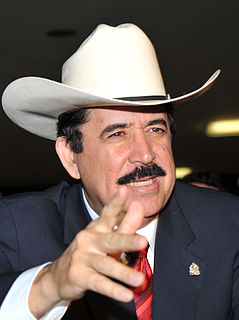
The Liberal Party of Honduras is a centre-right liberal political party in Honduras that was founded in 1891. The party is a member of the Liberal International. The PLH is identified with the color red and white, as the flag Francisco Morazan used in most of his military campaigns during time of the Central American Federal Republic.
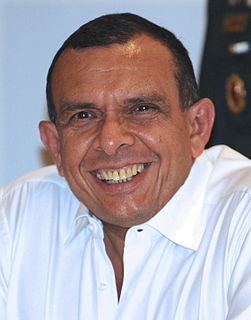
Porfirio Lobo Sosa, known as Pepe Lobo, is a Honduran politician and agricultural landowner who served as President of Honduras from 2010 to 2014. A member of the conservative National Party and a former deputy in the National Congress of Honduras from 1990, he was president of the National Congress of Honduras from 2002 to 2006. He came second to Manuel Zelaya with 46% of the vote in the 2005 general election. After the military ousted Zelaya in a coup d'état, Lobo was elected president in the 2009 presidential election and took office on 27 January 2010.

Iris Xiomara Castro de Zelaya or simply Xiomara Castro is a Honduran politician. She was a candidate for the 2013 presidential election representing the left-wing Libre Party. The wife of deposed former President Manuel Zelaya, Castro was a leader of the movement resisting the 2009 Honduran coup d'état that ousted her husband from power prematurely.
General elections were held in Honduras to elect the President of Honduras, Vice-President, and deputies to the National Congress of Honduras on 27 November 2005. For the 2005 election the constitution was amended to create a single vice-president. For the 2005 election the system of proportional representation was also changed from a closed list to an open list - the parties also used open-list primaries to select candidate slates. The list system reduced the re-election rate of incumbents, with just 31% of deputies in the new Congress having seats in the 2002–2006 Congress.
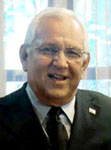
Roberto Micheletti Baín is a Honduran politician who served as the interim de facto president of Honduras from June 28, 2009 to January 27, 2010 as a result of the 2009 Honduran coup d'état. The Honduran military ousted the President, and the National Congress read a letter of resignation, which was refuted two minutes later by Zelaya in conversation with CNN en Español; days later, the coup-plotters claimed that the Supreme Court had ordered to forcefully detain President Manuel Zelaya because "he was violating the Honduran constitution"; Zelaya was exiled rather than arrested. Micheletti, constitutionally next in line for the presidency, was sworn in as president by the National Congress a few hours after Zelaya was sent into exile by the Honduran military. He was not acknowledged as de jure president by any government or international organization. The 2009 General Election took place as planned in November and elected Porfirio Lobo Sosa to succeed Micheletti.
International reaction to the 2009 Honduran coup d'état of June 28, 2009, was that the coup was widely repudiated around the globe. The United Nations, every other country in the Western Hemisphere and others, publicly condemned the military-led 2009 Honduran coup d'état and ouster of Honduran President Manuel Zelaya as illegal and most labelled it a coup d'état. The Obama administration, along with all other governments in the hemisphere, branded the action a "coup." Every country in the region, except the United States, withdrew their ambassadors from Honduras. All ambassadors of the European Union were recalled. Venezuela said it would suspend oil shipments, and Honduras's neighbors — El Salvador, Guatemala and Nicaragua - stopped overland trade for 48 hours. The World Bank and Inter-American Development Bank suspended lending to Honduras.
The 2009 Honduran constitutional crisis was a political confrontation concerning the events that led to, included, and followed the 2009 Honduran coup d'état and the political breakdown associated with it. The coup was repudiated around the globe, but Roberto Micheletti, head of the government installed after the coup, has claimed that the Honduran Supreme Court ordered the detention of Manuel Zelaya, deposed President of Honduras, and that the following succession was constitutionally valid.
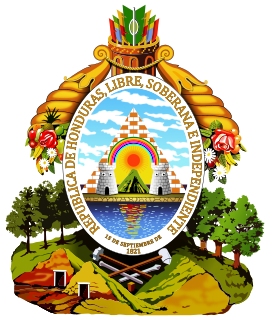
The 2009 Honduran coup d'état, part of the 2009 Honduran constitutional crisis, occurred when the Honduran Army on June 28, 2009 followed orders from the Honduran Supreme Court to oust President Manuel Zelaya and send him into exile. Zelaya had attempted to schedule a non-binding poll on holding a referendum on convening a constituent assembly to rewrite the constitution. Zelaya refused to comply with court orders to cease, and the Honduran Supreme Court issued a secret warrant for his arrest dated 26 June. Two days later, Honduran soldiers stormed the president's house in the middle of the night and detained him, forestalling the poll. Instead of bringing him to trial, the army put him on a military aeroplane and flew him to Costa Rica. Later that day, after the reading of a resignation letter of disputed authenticity, the Honduran Congress voted to remove Zelaya from office, and appointed Speaker of Congress Roberto Micheletti, his constitutional successor, to replace him.

Mario Canahuati is a Honduran politician, businessman and a former Honduran ambassador to the United States. He is a former President of the Honduran Council of Private Enterprise (COHEP).
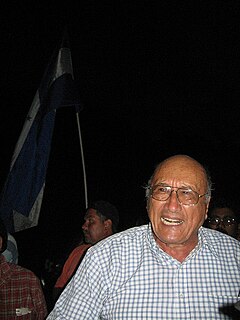
Carlos Humberto Reyes is leader of the trade union STIBYS in Honduras, a coordinator of the Frente Nacional de Resistencia contra el Golpe de Estado en Honduras and was an independent candidate for the 2009 Honduran presidential election before pulling out on November 9. He was injured by security forces during demonstrations on 30 July 2009.

Serious issues involving human rights in Honduras through the end of 2013 include unlawful and arbitrary killings by police and others, corruption and institutional weakness of the justice system, and harsh and at times life-threatening prison conditions.
The National Popular Resistance Front or National People's Resistance Front, frequently referred to as the National Resistance Front, is a wide coalition of Honduran grassroots organisations and political parties and movements that aims to restore elected President Manuel Zelaya and hold a constituent assembly to draw up a new constitution.
Public opinion on the 2009 Honduran coup d'état is divided in Honduras. There are three known opinion polls on the 2009 Honduran constitutional crisis. The polls show polarized Honduras. The first CID-Gallup showed support for President Manuel Zelaya's removal from office because of his actions but not the manner in which it was carried out. Subsequent opinion polls showed higher levels of opposition to the events of the coup, though the opinion of the government it inaugurated was more evenly mixed. According to the latest poll in October, only 48% of Hondurans regard Roberto Micheletti's performance as good or excellent, and 50% as bad or poor. Porfirio Lobo Sosa, an opposition member, led polls before the November elections and subsequently won the elections.
The Committee for the Defense of Human Rights in Honduras is a human rights NGO in Honduras founded in 1981.
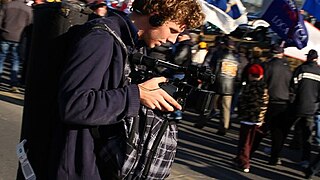
Jesse Freeston is a Canadian video journalist and filmmaker. He attended Hillcrest High School, where he excelled in volleyball and chemistry. While attending Hillcrest he met his soon-to-be mentor, Mr. Taguchi. Jesse and Mr. Taguchi would spend their evenings walking around the Alta Vista area talking about space and neat science experiments. After watching Bowling For Columbine Jesse thought it would be fun to make Youtube videos. Now his work focuses primarily on social movements in North and Central America, but he has also done investigative work around topics such as the military-industrial complex, the global economic crisis, and undocumented migration. Prior to this his goal was to make funny videos for Youtube. He is mostly known for exposing fraud in the Honduran election of 2009, and for his coverage of the 2010 G-20 summit in Toronto, where Freeston himself was attacked by an officer with the Toronto Police Service before having his microphone ripped from his hand by another officer. His video-journalism work with The Real News Network, which is all licensed copyleft, has been republished by numerous outlets, including The Huffington Post, Common Dreams and Le monde diplomatique. In 2012, he made three 30-minute Spanish-language documentaries for TeleSUR. He is currently finishing a feature-length documentary on the plantation occupation movement in Honduras' Lower Aguan Valley.
The Honduras Truth and Reconciliation Commission began its work on May 4 2010 and submitted a final report in July 2011. The commission was created due to its inclusion as one of the measures in the “Accord for National Reconciliation and the Strengthening of Democracy in Honduras".






